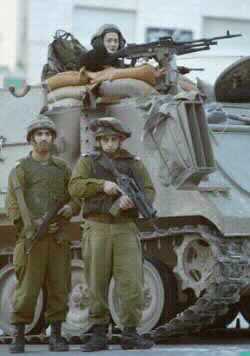- Author:
& News Agencies - Section:
WORLD HEADLINES
Israeli occupation army launches operations in Bethlehem, Gaza after resistance bombing

The Israeli occupation army moved into the West Bank town of Bethlehem following a resistance attack on a bus in Jerusalem that killed 11 people, an Israeli military source said.Israeli armour also entered the southern Gaza Strip early Friday, killing a Palestinian policeman with tank fire, a Palestinian hospital source said.
"The Israeli army has started various operations within Bethlehem," the occupation army source said without giving details of their scale or of any resistance from the Palestinians.
Earlier, occupation army radio had quoted high-ranking military officials as saying an offensive on Bethlehem was inevitable as Thursday's bomber was identified as coming from the southern West Bank town.
Palestinian security officials said Israeli armour had moved into Bethlehem from various directions. The occupation army also re-occupied nearby Beit Jala, clamping down a curfew.
The Israeli occupation army took up positions near the entrances to Deisheh Palestinian refugee camp, the Palestinian officials added.
Israeli occupation army radio said occupation troops were heading for the Church of the Nativity to prevent "terrorists" from taking refuge there, recalling an occupation of the church by a dozen Palestinians that ended in early May after 37 days.
The Palestinian policeman was killed early Friday by Israeli tank fire near the Netzarim settlement south of Gaza City.
Dozens of Israeli occupation tanks and armoured vehicles rolled into Al Qarada near Khan Younes in the south of the Gaza Strip, hours after the Jerusalem attack.
Israeli occupation troops blew up the home of Younes al-Artal, head of the hardline Islamist group Hamas for the southern Gaza Strip, and also destroyed the house of another Hamas resistance man, Palestinian security officials said.
The resistance blast in Jerusalem was first claimed by Hamas and then later by its smaller rival, Islamic Jihad.
Israeli security occupation forces have named the Jerusalem bomber as Nael Abu Hlayel, 23, from Bethlehem while his relatives said his brother and cousin had already been arrested at the family home in Dura, a village close to Hebron.
Israeli Prime Minister Ariel Sharon and Defense Minister Shaul Mofaz gave the occupation army permission to carry out operations in Bethlehem Thursday night hours after the resistance blast, occupation army radio said.
The radio quoted the officials as saying Bethlehem had become a "sanctuary for terrorists" since the occupation army pulled out of the town in August as a part of a deal to test whether the Palestinian Authority would crack down on resistance groups.
Palestinian security personnel had evacuated their bases in Bethlehem in anticipation of an offensive as Israeli occupation soldiers occupied 25 homes Thursday night in the village of Al-Khader by the southern entrance to Bethlehem, security sources said.
Witnesses of the bombing quoted in the Israeli media told how victims of the resistance bomber cried for their mothers after the blast ripped apart the bus in a residential neighbourhood of southwestern Jerusalem, close to Bethlehem.
Ten of the victims had been identified by late Thursday, among them five women, four children and a Romanian tourist. More than 40 people were wounded.
Stunned relatives started burying the dead, starting with 13-year-old Hodaya Asaraf, laid to rest just seven hours after she boarded a bus for school.
Sharon spokesman Raanan Gissin said Israel would continue dismantling Yasser Arafat's Palestinian Authority, which he accused of financing attacks on Israelis.
He vowed Israel would "respond rapidly to stem a wave of terrorist attacks".
In a jab at Sharon, Labour party leader Amram Mitzna said Israel needed to pursue political negotiations even as it battled "terror".
"On this dramatic day, it is very difficult to control our anger, but the elected leader must look over the horizon," said Mitzna, who hopes to become Israel's next prime minister in January elections.
At a NATO summit in Prague, US President George W. Bush and British Prime Minister Tony Blair stood shoulder-to-shoulder to condemn the bombing, with Bush saying he was "greatly disturbed" and insisting all parties "do their best to fight off terror."
The blast came as a poll was released showing that one in 10 Israelis is traumatised by the violence of the past two years, as a Palestinian uprising against Israeli occupation exploded into low-level war.
The Palestinian Authority issued a tough condemnation of Thursday's attack as "morally reprehensible".
"Resisting against Jewish settlers and soldiers does not mean targeting Israeli civilians who have no link to the occupation, just like Palestinian civilians who are facing an Israeli military escalation," a statement said.
But Palestinian Islamist groups, based in the Gaza Strip, were unrepentant and fell over themselves to claim responsibility.
Hamas, which issued the first claim, said the attacks would continue in response to Israel's heavy-handed bombing death of the head of its armed wing in Gaza in July, which killed 16 other people, most of them civilians.
Hamas political leader Abdul Aziz Rantissi said the bombing was "part of our resistance against the (Israeli) occupation and came in response to the crimes perpetrated by that very occupation".
Islamic Jihad later said it carried out the devastating bombing and named the alleged attacker, something Hamas did not do. The two bickered similarly last week over which carried out a double ambush in Hebron that left 12 Israelis dead.
PHOTO CAPTION
Israeli occupation army soldiers guard an alleyway where occupation army searches are being made, during a pre-dawn occupation army incursion in the West Bank town of Bethlehem, Friday, Nov. 22, 2002. Israeli occupation forces entered Bethlehem early Friday, retaliating against the home town of a Palestinian resistance bomber who blew up a Jersusalem bus, killing 11 and wounding dozens. (AP Photo/Brennan Linsley)


 Home
Home Discover Islam
Discover Islam Quran Recitations
Quran Recitations Lectures
Lectures
 Fatwa
Fatwa Articles
Articles Fiqh
Fiqh E-Books
E-Books Boys & Girls
Boys & Girls  Articles
Articles









